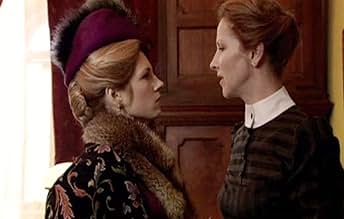AVALIAÇÃO DA IMDb
6,4/10
5 mil
SUA AVALIAÇÃO
O médico vienense Josef Breuer se reúne com o filósofo Friedrich Nietzsche para ajudá-lo a lidar com seu desespero.O médico vienense Josef Breuer se reúne com o filósofo Friedrich Nietzsche para ajudá-lo a lidar com seu desespero.O médico vienense Josef Breuer se reúne com o filósofo Friedrich Nietzsche para ajudá-lo a lidar com seu desespero.
Michal Yannai
- Bertha
- (as Michal Yanai)
Ayana Haviv
- Singer - 'Hymnus an den leben'
- (não creditado)
- Direção
- Roteiristas
- Elenco e equipe completos
- Produção, bilheteria e muito mais no IMDbPro
Enredo
Você sabia?
- Citações
Josef Breuer: How could I have given up everything?
Nietzsche: You'd given up everything long before you met me.
Josef Breuer: Yes, but now I have nothing.
Nietzsche: Nothing *is* everything. In order to grow strong, you must first sink your roots deep into nothingness. Learn to face your loneliest loneliness.
Avaliação em destaque
WHEN NIETZSCHE WEPT gives us an insight into the beginnings of Psychology and particularly the Treatment of Talking as begun not by Sigmund Freud, but instead by the brilliant yet troubled mind of philosopher Friedrich Nietzsche and the Viennese physician Dr. Josef Breuer. Pinchas Perry adapted the novel by the same name by Irvin D. Yalom and also directs this period piece. The film works on many levels: the flavor of the period is well captured (though Vienna in the film is Bulgarian locations!), the ideas are fresh to some, and the pacing and use of moments of fine classical music tidbits add flavor. If only more attention had been paid to the theories discussed...
1872 is the time and two men are haunted by demons, and the 'demons' happen to be failed love affairs with famous women. Dr. Josef Breuer (Ben Cross) is a famous physician but is obsessed with an hysterical young woman Bertha (Michal Yannai). Another beautiful lady enters Breuer's world in the form of Lou Salome (Katheryn Winnick) who has had a brief affair with the philosopher Nietzsche (Arman Assante) and feels he needs Breuer's help with his 'Talk Therapy'. The two men meet, share fears, and agree to a mutually beneficial relationship: Breuer will help Nietzsche with his migraines (due to his obsession with Lou Salome) and Nietzsche will share his philosophical approach to the world to help Breuer with is recurring nightmares. The resulting experience is an introduction to psychoanalysis as a treatment, a treatment that fascinates the young Freud (Jamie Elman).
The action is a bit heavy on the dream and surreal sequences instead of being a learned exploration of a very important period of history. The quality of acting is variable: Assante seems the only one to wholly grasp his role as Nietzsche. The film has many flaws but in the end it is an interesting introduction to the history of an important movement in medicine. It takes patience to watch but it is well worth the viewer's time. Grady Harp
1872 is the time and two men are haunted by demons, and the 'demons' happen to be failed love affairs with famous women. Dr. Josef Breuer (Ben Cross) is a famous physician but is obsessed with an hysterical young woman Bertha (Michal Yannai). Another beautiful lady enters Breuer's world in the form of Lou Salome (Katheryn Winnick) who has had a brief affair with the philosopher Nietzsche (Arman Assante) and feels he needs Breuer's help with his 'Talk Therapy'. The two men meet, share fears, and agree to a mutually beneficial relationship: Breuer will help Nietzsche with his migraines (due to his obsession with Lou Salome) and Nietzsche will share his philosophical approach to the world to help Breuer with is recurring nightmares. The resulting experience is an introduction to psychoanalysis as a treatment, a treatment that fascinates the young Freud (Jamie Elman).
The action is a bit heavy on the dream and surreal sequences instead of being a learned exploration of a very important period of history. The quality of acting is variable: Assante seems the only one to wholly grasp his role as Nietzsche. The film has many flaws but in the end it is an interesting introduction to the history of an important movement in medicine. It takes patience to watch but it is well worth the viewer's time. Grady Harp
- gradyharp
- 10 de dez. de 2007
- Link permanente
Principais escolhas
Faça login para avaliar e ver a lista de recomendações personalizadas
- How long is When Nietzsche Wept?Fornecido pela Alexa
Detalhes
- Data de lançamento
- País de origem
- Centrais de atendimento oficiais
- Idioma
- Também conhecido como
- When Nietzsche Wept
- Locações de filme
- Empresa de produção
- Consulte mais créditos da empresa na IMDbPro
- Tempo de duração1 hora 45 minutos
- Cor
- Mixagem de som
- Proporção
- 1.85 : 1
Contribua para esta página
Sugerir uma alteração ou adicionar conteúdo ausente

Principal brecha
What is the Spanish language plot outline for Quando Nietzsche Chorou (2007)?
Responda



























